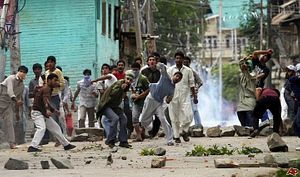When departing the subcontinent in 1947, the British left behind tea, cricket, and a few conflicts. Of those leftover conflicts, Kashmir remains unresolved even 70 years after the partition. India and Pakistan have fought three large-scale wars and witnessed several border skirmishes solely over this particular question, while continuously trying to strengthen control on their respective sides of Kashmir.
India, which controls two-thirds of Kashmir, uses coercive tactics to maintain control over its portion. This has repeatedly sparked violence and caused innocent civilian deaths over the years. The recent uprising in Kashmir in the aftermath of the death of Hizbul Mujahideen militant Burhan Wani (a renowned figure among Kashmiris) during a gun battle with security forces is a grim addition to this legacy. Burhan’s funeral attracted a large crowd, and an unending process of mass protest started afterwards. Since then, the Valley has endured the worst instability and violence since 2010. The June 2010 discontent also erupted because of an allegedly fake encounter by Indian Security Forces, which infuriated Kashmiris. The Valley remained in disorder for months.
Now, it’s been almost five months since Burhan Wani was killed and Indian-administered Kashmir is still under the jaws of curfew, with repeated blasts from pellet guns injuring civilians, and the brutality of security forces resulting in over 100 civilian deaths. But the Indian government is not ready to find a realistic way out, despite immense pressure from within. Opposition parties inside India believe that only dialogue is the way forward, and that the Valley’s long-term solution lies in talks. Indian Prime Minister Narendra Modi, however, was less concerned about the situation initially; he first spoke about the recent uprising six weeks after it began.
Later, sensing the situation was becoming grimmer, Modi changed his stance and called for talks after meeting with J&K opposition parties in New Delhi. Although Home Minister Rajnath Singh has already visited the Valley, his visit resulted in little more than the continuation of curfews, violence, and mass protests. A month later, Singh again traveled to Kashmir, but the trip was similarly unproductive. Another delegation of Indian parliamentarians also visited Kashmir, but the Hurriyat leaders refused to meet them, questioning their seriousness and lack of a mandate to resolve the crisis.
Pakistan, which favors a plebiscite in Kashmir according to the 1948 UN Security Council Resolution 47, exhibited serious concerns over Indian aggression and asserted the need for a peaceful resolution of the issue. Recently, Pakistan also officially requested a dialogue with India on Kashmir, but India turned the offer down yet again. New Delhi contended that it is ready for talks only on terrorism, believing that the current unrest in Kashmir is orchestrated by Pakistan.
Kashmir’s continued disputed status represents one of the longest modern day international territorial disputes and negatively impacts regional stability to a great extent. The recent Uri Attack, in which 18 Indian soldiers were killed in a pre-dawn ambush, has added more misery for the Kashmiri people and regional stability alike. India was quick to respond and claimed the attack was a cross-border infiltration by militants on the behest of Pakistan. Pakistan, for its part, denied any role in the carnage and instead called it an Indian plot to offset Kashmiri freedom struggle. Tensions further intensified when Pakistani Prime Minister Nawaz Sharif delivered a stiff speech at the 71st UN General Assembly debate and mentioned Burhan Wani in his address, calling him a “young leader” for Kashmiris.
With pressure to respond to the Uri attack burgeoning at home, India claimed that it successfully carried a “surgical strike” across the border, killing many militants and destroying their training camps. This claim, however, resulted in a range of criticisms from within India and from Pakistan also. Similar to Pakistan, Indian politicians also asked for proof of the surgical strike. For instance, Aam Admi Party Chief Arvind Kejriwal praised Modi for the strikes but wanted proof. Likewise, some analysts and opposition politicians also wanted evidence; however, they were criticized for being disloyal to the country.
If India thought that this summer’s uprising would last for a few days, it was wrong. It has been five months since the unrest has stalled ordinary life. Even if it had been for a shorter period, the resurgence would have been inevitable since Kashmiris have not given up their efforts for independence.
Moreover, an attack that took place in Indian-administered Kashmir has put the entire region on the brink of yet another India-Pakistan military entanglement. Border skirmishes have already intensified and resulted in collateral damage.
Modi’s Balochistan statement and threats to stop the flow of Pakistani water could well distract international eyes temporarily, but it does not offer India room to ignore Kashmir with the troubled situation on the ground.
New Delhi has successfully dealt with many social and economic snags in recent decades; however, failure in solving the Kashmir question remains a big impediment in its pursuit of regional hegemony and global power.
Muhammad Daim Fazil is Lecturer of International Relations at University of Gujrat, Sialkot Campus, Pakistan. He was July 2016 Visiting Fellow at the Henry L. Stimson Center Washington D.C. He tweets @DaimFazil.

































